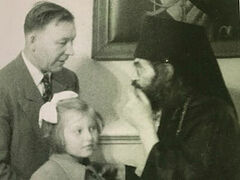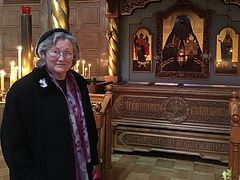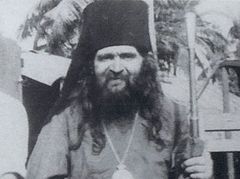By God’s grace, Lydia Petrovna Gerich, the oldest Russian scout in the world, turned one hundred and three on March 6. She still participates in the life of the “Putivl” Scout Troop, which she helped to organize in 1962 at the Russian Orthodox Cathedral of St. John the Baptist in Washington, DC. She also attends the Liturgy there almost every Sunday. And she stands during the service, from start to finish.
We met Lydia Petrovna at the home of her son, Yury Andreyevich, where she stays on weekends, and together they shared how, despite living all their life in the foreign lands, they still managed to keep their Russian culture and the Orthodox faith.
The upbeat attitude that prevails in this family can be vividly characterized, in my opinion, by the following “anecdote.” At the beginning of our conversation, Lydia Petrovna misspoke and said that she would soon turn one hundred and thirteen. The younger generation of her family immediately joked, “One hundred and thirteen? That would have been great!”, while her son corrected her: “Mom, you will be one hundred and three, not one hundred and thirteen!” To that, Lydia Petrovna replied coyly: “But you have just disclosed my real age!”
 Lydia Gerich, December 2022 —Lydia Petrovna, do you consider yourself a happy person?
Lydia Gerich, December 2022 —Lydia Petrovna, do you consider yourself a happy person?
Lydia Petrovna:
—Yes, I consider myself a happy person. I live with my daughter in the suburbs of Washington, but on weekends I come to my son’s and we go to church here. I feel that my senior years are really blissful and happy. It’s so important for me that I don’t have to live in a nursing home next to other old women like me.
Yury Andreyevich:
—Mom was always afraid she would end up in a nursing home. But we told her it wouldn’t happen.
Lydia Petrovna:
—Thank God I have a good relationship with my son-in-law and daughter-in-law. I hope I’m not like a mother-in-law in that Russian, often sinister, sense of the word. But what amazes me is that my daughter married a Swede who is so much like any Russian man, and as good-hearted as we are—he is always trying to be helpful, giving me a chocolate here and helping with my chair there. I am very happy to have such a relationship with my family, and they are very good people. This is very important for keeping peace in the family.
—Yuri Andreyevich, is it real happiness to be preparing to celebrate your eightieth anniversary with your mother?
—Of course, it’s real happiness! Mom is the “star” in our scouting organization, in the church, and, of course, in our family. We are happy not only to have her with us, but also to know that our family has such strong genes. Her sister recently passed away at the age of one hundred, while her father, Pyotr Dmitriyevich Moczniy, lived to be ninety-five. He served in the Russian army before the revolution and he told me many stories about it. He too, like the rest of us, was grateful to have survived all the calamities that befell him and have made it to America. Grandpa would light a candle in church for this country every Sunday because, as he said, this country had taken us in. He couldn’t really understand why it happened, since we hadn’t done anything for this country at the time. Many people come here these days and they immediately demand things from the government. These people don’t have the sense of gratitude that the older generation of immigrants had.
It so happened that immigration to the USA went smoothly for our family—all of us received an education and found good jobs. By the way, the Russian diaspora here was considered the most educated. It also had the lowest crime rate. I am talking about people from the so-called second immigration who arrived to the United States after the Second World War and the Great Patriotic War.
For ten years, I attended a Russian Orthodox school six days a week. Our Russian community was our life
—I remember that we bought a car five years after we came here and a house seven years later. Our Russian friends in San Francisco were in the same situation. There were thirty thousand Russians living there at the time, and we had the Russian Center. For ten years, I went to a Russian Orthodox school six days a week. We lived in our Russian community. I often say that in the morning I was an American and a Russian in the afternoon. It helped us to preserve not only our language, but also our traditions and the Orthodox faith.
—Lydia Petrovna, you still come to church almost every Sunday. Not only do you attend the Liturgy, you also stand from start to finish, never sitting down. How important is it for you to be in church, how important is the Orthodox faith for you?
—It has always been truly important for our family. I was born in Belorussia, where my father was fighting in the war, when my mother purposely came to be with him to give birth. Two months later, we returned to our home in Dvinsk, Latvia, and that was where I spent my childhood. Of course, there was also an Orthodox church and many Russians lived there. All of us used to go to church every Sunday together, and we celebrated all the holidays there. We lived in Latvia as if it were Russia, we didn’t have anything in common with the Latvians and we mingled exclusively with the Russians. We had our Russian theater, Russian school, and even the Russian Teachers Institute from which I graduated.
 Lydia Gerich with fellow Scouts, 1984
Lydia Gerich with fellow Scouts, 1984
—We had the scouting organization I had joined when I was fourteen. So, I’ve been a Scout for almost ninety years. We went camping, sang Russian songs, had Scout meetings, and celebrated Orthodox Christmas, along with Grandfather Frost and the Snow Maiden.
—And then you ended up living in the Soviet Union, when Latvia became a part of the USSR...
—My father owned a large house and a toy store, and the Soviet authorities made us sign a document saying that we were donating our property to the state. We had no other choice. We were thrown out of our big apartment and put into two small rooms. Every night we would hear cars coming and taking away our neighbors. One time, the soldiers even took a mother and left her child behind. We realized that eventually they would come and take us as well.
—I know that during the fascist occupation of Latvia you helped the Soviet prisoners of war. Could you tell me about it?
—There were a lot of POWs in Dvinsk. The majority of them stayed in the camp, but some others were settled in the city under guard. When they were led down the street, we would sometimes give them food. On Great and Holy Saturday before Pascha in 1942, our priest, Fr. Leonid, asked us to put together and deliver the blessed festive foods to the prisoners.
A small barrack with prisoners of war was located not far from our house. My sister and I, with the help of our mother, put together a basket of festive foods and went there on Pascha. We explained to the German soldier at the entrance that it was our holiday and we wanted to congratulate our people. He did not mind.
The door was open and the soldiers were sitting on their beds. We told them, “Christ Is Risen!” We wanted to come over and share Paschal kisses with them, but no such luck! They were gone like the wind: they all jumped off their beds and took off running out of the barrack.
My sister and I couldn’t at first quite understand what was going on, but then we saw our soldiers gathered by the water-pump, washing their faces. Then they returned smiling at us. It was then that we could finally share Paschal kisses with them and start a conversation. They were surprised to know that we, Russians, live in Latvia. They also shared memories about their mothers and how they also baked the same kulichi, but they called them “sweet breads.” Or, when they colored eggs, they explained that it was just “to make eggs look nice.”
We spent a long time sharing stories about life, and they asked us to come again. But a week later, they were gone, and we failed to find out what happened to them.
I also remember that we had a concert in our local theater. An artificial campfire was lit on the stage, and the prisoners of war, dressed in military uniforms, gathered around it, but they had no insignia. They were singing a sad song, “A Small Town in the South,” and it was obvious they were thinking of their homeland—many of them shed tears. The audience in the theater were crying, too. I felt so terribly sorry for those Russian soldiers.
—Yury Andreyevich, do you remember anything from wartime?
—When the war ended, I was a little over a year old, and I only remember how we lived in a refugee camp in Germany. My grandfather never talked about the war. We feel really lucky that our family escaped the war without seeing all of its horrors.
But I’ll tell you this though: I still have a feeling of safety every time I’m inside a tunnel. First off, I couldn’t understand why. And only later I was told that the train that took us away from Latvia used to hide inside the tunnels to avoid being bombed.
—How did it happen that your family was forced to leave your home country and settle in foreign lands?
We were afraid to stay in Latvia, because even before the war we already knew that we were on the “black list” and that the NKVD would soon come to get us
Lydia Petrovna:
—One day, I was visiting my friend’s house in Riga, and it was where I met my future husband, who was a student at the time. He courted me and we got married in 1943. When the Soviet army advanced, we were offered to go to Germany. We were afraid to stay in Latvia, because even before the war, we already knew we were on the “black list” and the NKVD would soon come and get us. We were advised against it and told not to be afraid of anything. But we knew they would come to get us as well and so we left Riga with the last train.
My husband and I were allowed to take with us my sister, brother, and our parents who were still living in Dvinsk. We were already situated in our car, but their train was running late and our family was nowhere to be seen. We were horror-stricken at the thought that we might never see them again. It was pure tragedy. So, there we were, sitting in our train car, when suddenly we saw our loved ones running down the platform. Imagine this! We were reunited at the very last moment! We’ve hardly ever been apart since. We were simply that lucky, and I’ll never forget it.
Yury Andreyevich:
—I was only three months old at the time. As my father explained to me, we spent two months on that train. It would first go to one state border only later to return to another. At first, we arrived at Italy, then Austria, and, by the end of the war, we ended up in Schleissheim, a suburb of Munich in the American occupation zone. For several years, we lived in a barrack waiting for an opportunity to move elsewhere.
—You say you were lucky and didn’t see all the horrors of the war. But your family survived one of the most terrible moments—the bombing of Dresden in February 1945, when the British Air Force dropped about a thousand bombs on the city, with Americans later repeating that raid...
Yury Andreyevich:
—As a matter of fact, Dresden had no military installations, no factories, nothing but refugees from all over Europe, including Russia. There were so many people that some of them had to survive living on the streets. I still can’t wrap my mind around it—why did the British and Americans bomb that city?
But I agree that we got really lucky, as we left Dresden in time, before the bombing. Our family lived in the suburbs at the time, where my father worked on the railway. But we somehow were separated from our grandfather and grandmother. My father and Aunt Ira traveled to the city trying to find them. It’s impossible to believe, but a miracle happened. They came to a house, knocked, and all of a sudden Grandpa opened the door. It was by pure chance.
—How did you end up in America?
Yury Andreyevich:
—Back then, America was running a very good program: People could find a sponsor in the U.S. who agreed to support refugees. My grandmother was the first to go there—it turned out that her sponsor belonged to the family of the famous Russian-born actress Natalie Wood. She lived in Hollywood, but her family lived closer to San Francisco, and so my grandmother worked as their caretaker. Later on, the rest of our family came to America.
—Yuri Andreyevich, you were born back in Latvia, lived for several years in Germany, and then spent the rest of your life in the USA. How were you able to keep your faith and remain Russian in spirit?
—As refugees during the war, and right afterwards, we had to cross different borders and then we finally arrived in the American zone in Germany. A border guard looked at our passports and asked: “Who are you?” My parents said that we were Russians. He replied, “Look, one of you was born in Ukraine, another in Belarus, the third in Latvia, and the fourth in Germany. How can you consider yourselves Russians?” That’s when my father said something wonderful in response: “If a sparrow is hatched in the stable, it doesn’t mean it’s a horse.
Russian culture, if we compare it with the American culture, is so rich that I feel truly blessed to be Russian. The most important thing is to preserve our language, because through it you learn the Russian culture. I used to work in the U.S. State Department as an interpreter and I could never understand why, say, ambassadors didn’t speak the language of the country in which they worked. They will never know the culture of that country!




